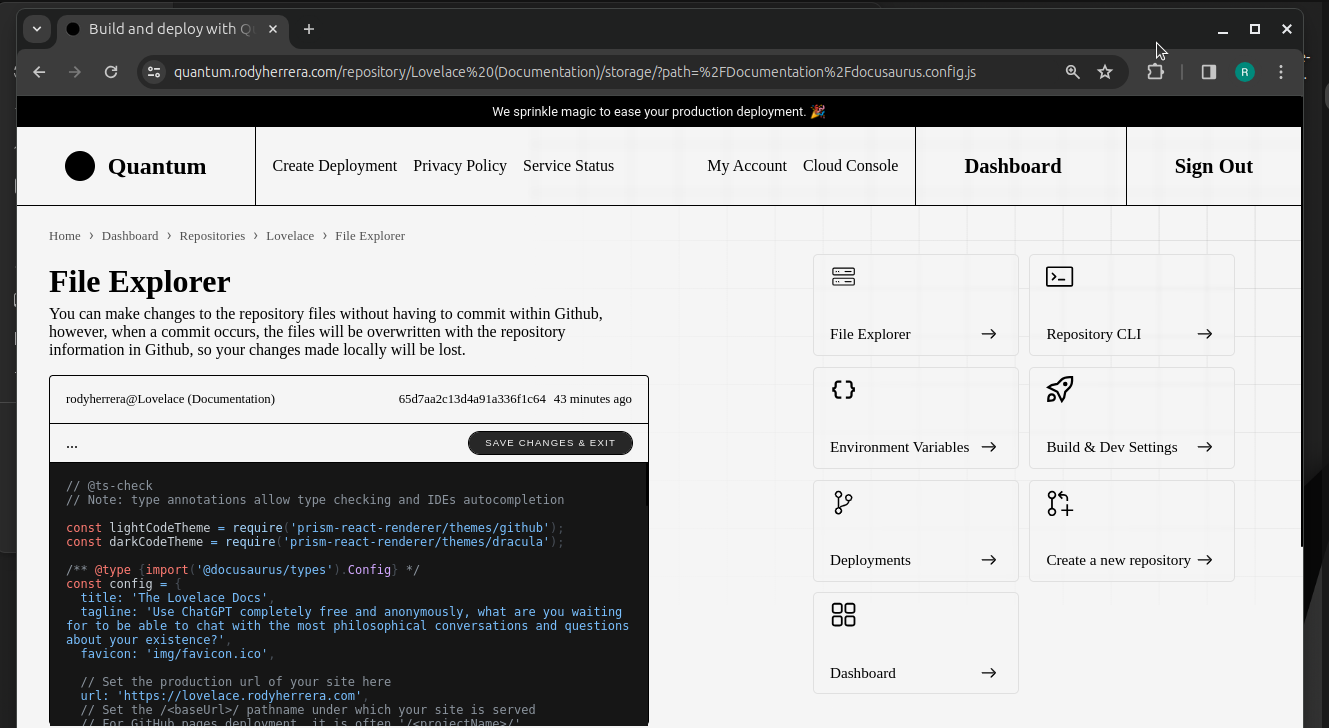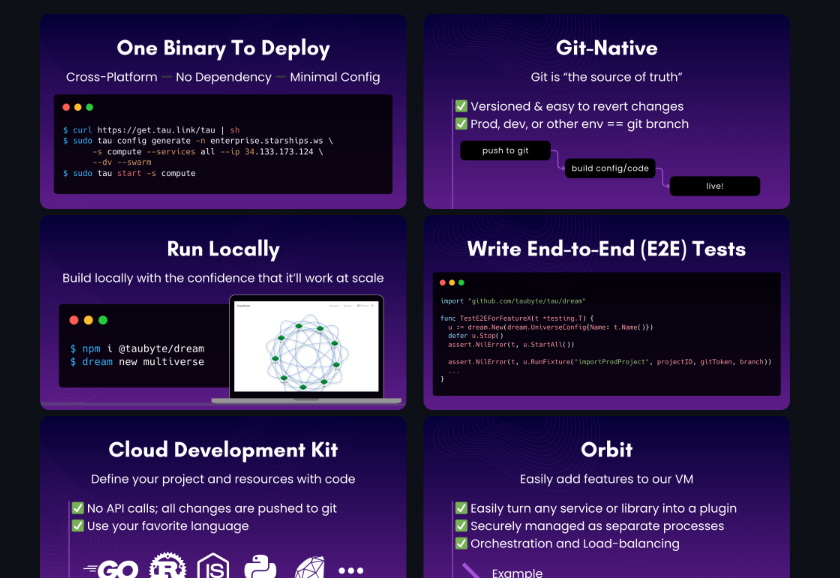Vercel and Netlify as CI/CD Platforms: Why You Should Consider These 6 Free Open-Source Alternatives
Table of Content
Vercel and Netlify are leading platforms for Continuous Integration and Continuous Deployment (CI/CD) in modern web development. They offer seamless experiences by automating deployment, integrating with Git repositories, and supporting fast, global-scale web application delivery.
These platforms are popular for their ease of use, built-in serverless functions, and ability to manage frontend frameworks like Next.js (Vercel) and JAMstack (Netlify).
While Vercel and Netlify provide excellent services, developers and teams are increasingly exploring open-source alternatives to address flexibility, customization, and cost concerns. Open-source platforms allow full control over infrastructure, greater customization, and avoid vendor lock-in.
This is particularly appealing for startups, developer teams, and enterprises with specific security or performance needs.
Why Open-Source Alternatives Matter
- Customization and Control: Vercel and Netlify limit developers' control over CI/CD pipelines. Open-source alternatives provide full access to configuration, enabling teams to tailor pipelines to their specific project needs.
- Cost Efficiency: As businesses scale, usage-based pricing of platforms like Vercel and Netlify can escalate quickly. Open-source CI/CD solutions allow companies to self-host their pipelines, reducing costs as infrastructure grows.
- Avoiding Vendor Lock-In: Proprietary platforms can create dependencies that hinder migration to other services. Open-source solutions offer flexibility and ensure teams aren't tied to a single vendor's ecosystem.
- Security and Compliance: For enterprises or teams with strict security requirements, deploying open-source solutions in-house allows greater control over sensitive data and compliance with security standards.
Benefits for Startups
Vercel and Netlify offer startups quick, scalable solutions for launching web applications without infrastructure concerns. Their global deployments with zero configuration are ideal for lean teams needing speed.
However, as startups grow, proprietary solution costs can become significant. Open-source alternatives allow continued scaling while managing costs effectively.
Benefits for Web Development Agencies
Agencies benefit from Vercel and Netlify's simplicity, especially with client-facing features like preview URLs and fast deployment times. However, as open-source alternatives offer more control over development environments, making it easier to meet custom client needs.
Agencies and startups can also integrate with a wider range of tools that proprietary platforms may not support.
Benefits for Developer Teams
Developer teams using Vercel and Netlify enjoy built-in CI/CD workflows that integrate seamlessly with Git. However, advanced teams often need to configure pipelines beyond these platforms' offerings.
Benefits for Enterprises
Enterprises prioritize scalability, security, and flexibility. While Vercel and Netlify offer excellent managed infrastructures, they may not meet the strict compliance or customization needs of large organizations.
6 Open-source CI/ CD Self-hosted Platforms
1- Coolify
Coolify is an open-source, self-hosting platform that simplifies deploying and managing applications and databases. It offers a user-friendly interface for developers to set up and manage services like Docker containers and databases with minimal configuration—making it an excellent alternative to managed cloud services.
Coolify supports various development workflows, including CI/CD, and integrates seamlessly with platforms like GitHub and GitLab. This allows developers to focus on building applications without worrying about complex deployment processes.
Features of Coolify:
- Docker Support: Deploy Dockerized applications with just a few clicks, managing containers without deep DevOps knowledge.
- Database Management: Built-in support for various databases, including PostgreSQL, MySQL, and MongoDB, enabling easy database creation and management.
- CI/CD Integration: Seamless integration with GitHub, GitLab, and Bitbucket for continuous deployment pipelines, automating build and deployment workflows.
- SSL and Domain Management: Simplifies domain management by automatically providing SSL certificates and custom domain support.
- One-click App Deployment: Deploy popular applications like WordPress and Ghost with minimal configuration.
- Resource Monitoring: Real-time monitoring of CPU, memory, and disk space, ensuring full visibility into your infrastructure's performance.
- User-friendly UI: A clean, modern interface for easy management of apps, databases, and services, reducing the complexity of traditional self-hosting.
- Open-Source & Self-Hosted: Fully open-source, allowing you to host your own instance and maintain complete control over your deployments without relying on third-party services.
- Custom Apps: Support for deploying any custom Docker-based applications, offering flexibility for various tech stacks.
Coolify is an ideal solution for developers seeking an open-source, self-hosted alternative to cloud platforms like Heroku, offering full control over deployment and management workflows.
2- Quantum

Quantum is a free and open-source 🚀 hackable & self-hosted alternative to Vercel, Heroku, Netlify, etc. All your applications, just in one place.
It enables you to develop and deploy with your favorite tools, and enjoy continuous deployment with GitHub.
Quantum Features:
- Github Integration: Securely connect your GitHub account to Quantum for repository access and management of deployments.
- Cloud Shell: Access a dedicated environment for executing commands directly on your Virtual Private Server (VPS) or hosting environment where Quantum is deployed.
- Repository Command Line Interface (CLI): Each deployed repository comes with its own CLI for monitoring execution output (logs) and executing specific commands.
- File Explorer: Make local changes within your repository without requiring a GitHub commit or application redeployment. Changes are overwritten upon subsequent commits.
- Command Panel: Configure commands such as dependency installation, source code building, and software startup within a dedicated panel.
- Tailored User Experience: The user interface (web-ui) is completely responsive, designed considering every detail, with the aim of giving you an optimal experience compared to other open-source alternatives of the same nature.
- Environment Variable Management: Manage environment variables associated with your deployment, with automatic mapping of variables upon repository cloning. Create, delete, and modify variables as needed.
- Continuous deployment: When a commit is made to the repository within Github, it is automatically redeployed to Quantum.
- Service Status: You can check the status of the server through the web-ui. It will determine if the server is working in optimal conditions or if it is overloaded.
- Docker-Based Isolation: Each user receives a dedicated Docker instance for their deployment, ensuring smooth operations and minimizing conflicts.
3- Tau

Tau is an open-source self-hosted platform for dev teams, devops, startup, and enterprise that enables them to have their own Netlify and Vercel alternative with full control of their data.
It is written in Go language, and comes with full support of Github actions and CI/CD operations.
It is easy to install, configure and run as the platform itself is one binary file.
4- Dokploy
Dokploy is a free self-hostable Platform as a Service (PaaS) that simplifies the deployment and management of applications and databases.
Features
- Applications: Deploy any type of application (Node.js, PHP, Python, Go, Ruby, etc.).
- Databases: Create and manage databases with support for MySQL, PostgreSQL, MongoDB, MariaDB, Redis.
- Backups: Automate backups for databases to a external storage destination.
- Docker Compose: Native support for Docker Compose to manage complex applications.
- Multi Node: Scale applications to multiples nodes using docker swarm to manage the cluster.
- Templates: Deploy in a single click open source templates (Plausible, Pocketbase, Calcom, etc.).
- Traefik Integration: Automatically integrates with Traefik for routing and load balancing.
- Real-time Monitoring: Monitor CPU, memory, storage, and network usage, for every resource.
- Docker Management: Easily deploy and manage Docker containers.
- CLI/API: Manage your applications and databases using the command line or trought the API.
- Notifications: Get notified when your deployments are successful or failed (Slack, Discord, Telegram, Email, etc.)
- Self-Hosted: Self-host Dokploy on your VPS.
5- Kiae
Kiae is a cloud native application develop platform base on the Kubernetes and Istio.
Features
- Git integration (GitHub, BitBucket, GitLab)
- Build image from the Git source repository
- Automatically push image to the image registry
- Deploy any image to multiple environments and multiple clusters
- Application level Observability with the Open-Telemetry
- Dependents management for the applications and the middlewares
- ConfigFiles management base on the ConfigMap and Secret
- Environments management for the multiple environments and multiple clusters
- Routes management base on the Istio VisualServices
- Entrypoint management base on the Istio IngressGateway
- Access controls management base on the Istio AuthzPolicy
- Web UI which provides real-time view of application activity
- SSO Integration (OIDC, OAuth2, LDAP, SAML 2.0, GitHub, GitLab, Microsoft, LinkedIn)
6- Kubero
Kubero [pronounced: Kube Hero] is a self-hosted PaaS (Platform as a Service) that allows any developer to deploy their application on Kubernetes without specialized knowledge. Kubero follows the principles of 12-factor apps. It is possible to run apps based on existing containers or from source code.
Features
- Create unlimited CI/CD pipelines with up to 4 separate staging environments for all your applications
- Automatically build, start, and cleanup review-apps after opening/closing a pull request
- Automatic redeployment of the app based on a push to a branch or tag
- Create scheduled tasks as cronjobs
- Deploy well known apps with templates (WordPress, Grafana, ...)
- Easy deployment of your docker containers on Kubernetes without writing helm charts
- Deploy add-ons along your application (PostgreSQL, Redis, and more ...)
- Easy access of application logs in the web-UI
- Easy and safe restart of the application in the web-UI
- Triggered or periodic vulnerability scans of your running apps
- Comes with an API and CLI to integrate with your existing tools and CI/CD
- Built-in container web console
- Build and deployment Notifications to Discord/Slack/Webhooks
- Integrated metrics and monitoring
- SSO with GitHub and Oauth2
- Supported Git services include: Github, Gitlab, Gitea (Selfhosted), Gogs, Bitbucket, Forgejo.









